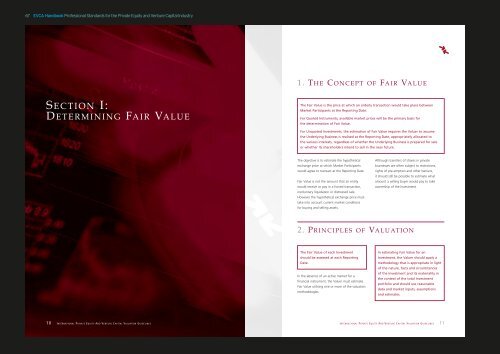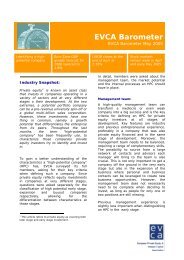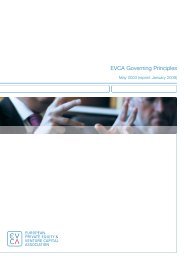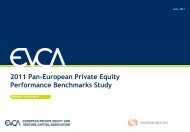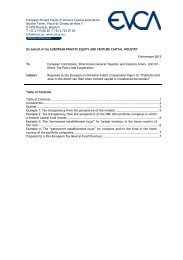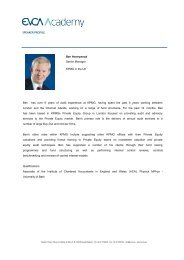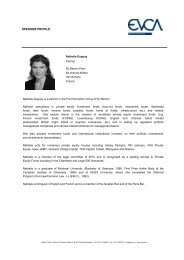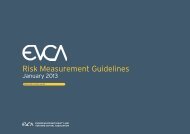EVCA Handbook Professional Standards for the Private Equity and ...
EVCA Handbook Professional Standards for the Private Equity and ...
EVCA Handbook Professional Standards for the Private Equity and ...
- No tags were found...
You also want an ePaper? Increase the reach of your titles
YUMPU automatically turns print PDFs into web optimized ePapers that Google loves.
67 <strong>EVCA</strong> <strong>H<strong>and</strong>book</strong> <strong>Professional</strong> <strong>St<strong>and</strong>ards</strong> <strong>for</strong> <strong>the</strong> <strong>Private</strong> <strong>Equity</strong> <strong>and</strong> Venture Capital Industry1. T HE C ONCEPT OF FAIR VALUES ECTION I:D ETERMINING FAIR VALUEThe Fair Value is <strong>the</strong> price at which an orderly transaction would take place betweenMarket Participants at <strong>the</strong> Reporting Date.For Quoted Instruments, available market prices will be <strong>the</strong> primary basis <strong>for</strong><strong>the</strong> determination of Fair Value.For Unquoted Investments, <strong>the</strong> estimation of Fair Value requires <strong>the</strong> Valuer to assume<strong>the</strong> Underlying Business is realised at <strong>the</strong> Reporting Date, appropriately allocated to<strong>the</strong> various interests, regardless of whe<strong>the</strong>r <strong>the</strong> Underlying Business is prepared <strong>for</strong> saleor whe<strong>the</strong>r its shareholders intend to sell in <strong>the</strong> near future.The objective is to estimate <strong>the</strong> hypo<strong>the</strong>ticalexchange price at which Market Participantswould agree to transact at <strong>the</strong> Reporting Date.Fair Value is not <strong>the</strong> amount that an entitywould receive or pay in a <strong>for</strong>ced transaction,involuntary liquidation or distressed sale.However <strong>the</strong> hypo<strong>the</strong>tical exchange price musttake into account current market conditions<strong>for</strong> buying <strong>and</strong> selling assets.Although transfers of shares in privatebusinesses are often subject to restrictions,rights of pre-emption <strong>and</strong> o<strong>the</strong>r barriers,it should still be possible to estimate whatamount a willing buyer would pay to takeownership of <strong>the</strong> Investment.2. P RINCIPLES OF VALUATIONThe Fair Value of each Investmentshould be assessed at each ReportingDate.In <strong>the</strong> absence of an active market <strong>for</strong> afinancial instrument, <strong>the</strong> Valuer must estimateFair Value utilising one or more of <strong>the</strong> valuationmethodologies.In estimating Fair Value <strong>for</strong> anInvestment, <strong>the</strong> Valuer should apply amethodology that is appropriate in lightof <strong>the</strong> nature, facts <strong>and</strong> circumstancesof <strong>the</strong> Investment <strong>and</strong> its materiality in<strong>the</strong> context of <strong>the</strong> total Investmentportfolio <strong>and</strong> should use reasonabledata <strong>and</strong> market inputs, assumptions<strong>and</strong> estimates.10 I NTERNATIONAL P RIVATE E QUITY A ND V ENTURE C APITAL VALUATION G UIDELINES I NTERNATIONAL P RIVATE E QUITY A ND V ENTURE C APITAL VALUATION G UIDELINES 11


